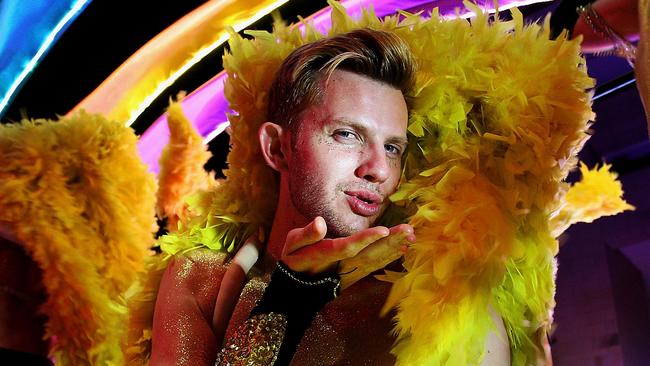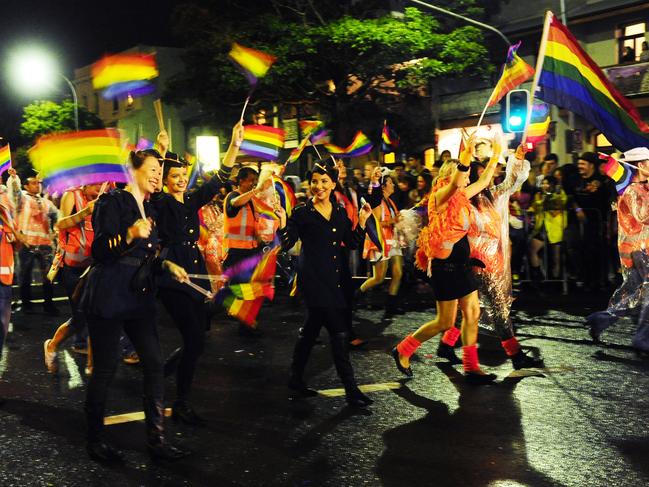Why we need Mardi Gras more than ever
Since the passing of same sex marriage it’s easy to think that the fight for equality has been won. But a brutal NSW hate crime shows we still have so far to go, argues David Mills.
Rendezview
Don't miss out on the headlines from Rendezview. Followed categories will be added to My News.
Back in the gay version of ancient times, the early 1990s, when I took my first steps into the world of gay venues, it was not uncommon to see bar patrons carrying whistles.
Sometimes stashed in a pocket, other times slung around the neck, the whistles were not carried for aesthetic affect, although they did become a bit of a statement item, a marker of gay identity like a very short, neat haircut, or a Keith Haring AIDS T-shirt.
The whistles – an idea imported from the homotropolises of the US – were primarily an alarm device, designed to be blown loud and long if there was a threat of violence.
I don’t know if whistle blasts prevented many hate bashings from happening, but the threat certainly felt real to people on the scene at the time.
One friend tells me that back in those days, whenever he walked between Kings Cross and the bars of Darlinghurst at night, he’d wrap his keys between his knuckles – ready, in his words, “to hurt anyone who dared come near me”.
It was an era when bashings were a frightening reality of gay life, and the NSW Police was at times negligent, sometimes even complicit in the violence meted out to sexual and gender minorities, particularly gay men.

Sydney’s gay, lesbian, bi and trans community responded in its signature fashion: it got organised. Free whistles were provided at bars alongside the ever-present safe sex information; cut-price self defence classes were offered; street patrols were undertaken by community members who felt the police were indifferent to the problem.
Over time, these safety fears lessened. The police piloted and then rolled out an effective Gay and Lesbian Liaison Officer program. The emergence of mobile phones made people everywhere that bit more secure, and HIV stigma – heavily linked to gay bashings in the 1980s and 1990s – reduced over time.
Professor Stephen Tomsen, Professor of Criminology and Criminal Justice at the University of Western Sydney, said with regard to anti-gay attacks, the “number of assaults and killings both appear to have dropped in recent decades because of anti-violence campaigns raising victim awareness about dangerous places and social situations”.
“And importantly, there has been a general decline of sexual activity at public but dark and secretive ‘beats’ with the trend towards meeting partners through social media,” Prof Tomsen said.
“We know that is not wholly risk free, but it’s a likely deterrent to many perpetrators who face easier detection than in the past.”

The February 2 murder of a man in bushland near Broulee, who reportedly met his three attackers via the gay meeting app Grindr, was a devastating reminder of the risks Prof Tomsen referred to.
There is much that we don’t know about the interaction between married father of three Peter Keeley, 56, and his 17-year-old attackers, but media reports stated initial contact was made on Grindr. Mr Keeley drove from Canberra to Broulee to meet at least one of the men. His hands were later bound, and he suffered head and facial injuries before he died.
This last, horrible fact could be telling. According to a research paper prepared by the Australian Insitutute of Criminology last year by Jenny Mouzos and Sue Thompson, the victims of gay-hate related homicides are more likely to have been beaten to death than the male victims of other sorts of homicides – and they are also more likely to die at the hands of more than one assailant.
“Many perpetrators of prejudice related violence employ a ‘hands-on’ attack of a very physical nature,” the authors grimly stated in their report.
It is hard to imagine the depths of pain that the brutal circumstances of Mr Keeley’s death would have caused for his family and loved ones. My sympathies go out to them.
But it is also heartbreaking to imagine that a standard precaution for anybody meeting a stranger via an app – the simple act of telling a friend – may not have been an option for Mr Keeley.

His death was a shocking reminder of the homophobia that still lingers in pockets of Australia, and also the way in which new technologies have made us more vulnerable. Previously, gay precincts offered the safety of numbers, whereas meeting apps can leave people more exposed to misadventure in private locations.
This Saturday Sydney will celebrate the Gay and Lesbian Mardi Gras Parade. Throughout its 42 years, the event has effectively bulldozed gay concerns into mainstream Australian consciousness.
In that time, we have had same-sex marriage introduced. Openly gay, lesbian, bi and trans people have proudly taken their place in all sorts of areas of public life – from our parliaments to our prime-time TV slots.
Australia has come so far.
But Mr Kelley’s death shows we have so far to go. The whistles have been put away but the threat of homophobic violence continues.
And so, on Saturday, that march forward goes on.
For Lifeline support phone the 24/7 service on 13 11 14.
